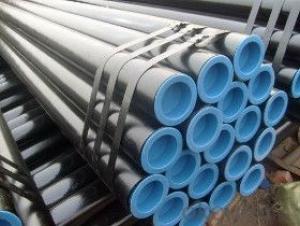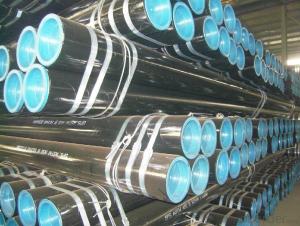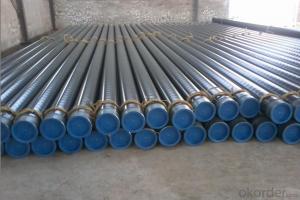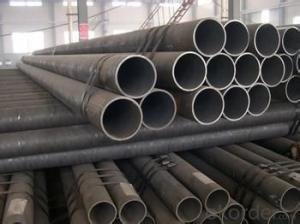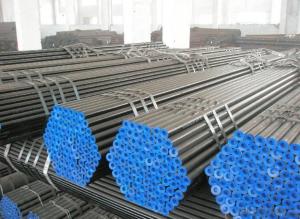Seamless Black Steel Pipes API5L,GB,ASTM,ASME,DIN
- Loading Port:
- Tianjin
- Payment Terms:
- TT OR LC
- Min Order Qty:
- 44 m.t.
- Supply Capability:
- 500 m.t./month
OKorder Service Pledge
OKorder Financial Service
You Might Also Like
Product Description:
1. Commodity Name: Seamless steel pipe
2. Standard: API,GB,ASTM,ASME,DIN
3. Quality grade: 10#, 20#, A106B, A53B, API 5L B, Q235, Q345, ST37-2, ST 45, ST52.etc.
4. Dimension:
OD: 1/2"-24"
WT: 2.5-80mm, SCH10~SCH40~XXL
length: 5.8m,6m,8m,9m,12m
5. Technique: Hot Rolled/Cold Rolled/ Cold Drawn
6. application
carbon seamless steel pipes are widely used in gas, water and oil, transpotation;constructions;Bridge,highway,windows of model steel door; building materials;fences;heating facilities Fluid Pipe;conduit pipe,scaffolding pipe.etc.
7. Payment Terms: L/C D/A D/P T/T
8.packing and shipment
Packaged in bundles,as per customers' requirements, it can also bepackagesd as beveled ends, typed marking, black painting, plastic caps protection,woven bags packing
For 20" container the max length is 5.8m; For 40" container the max length is 12m. other options are available based on customer requests. Please discuss when placing orders.
9. Surface: painted with varnish;
10. Plastic caps at ends.
11. Tolerance: OD +1%/-1%
WT +12.5%/-10%
9.picture
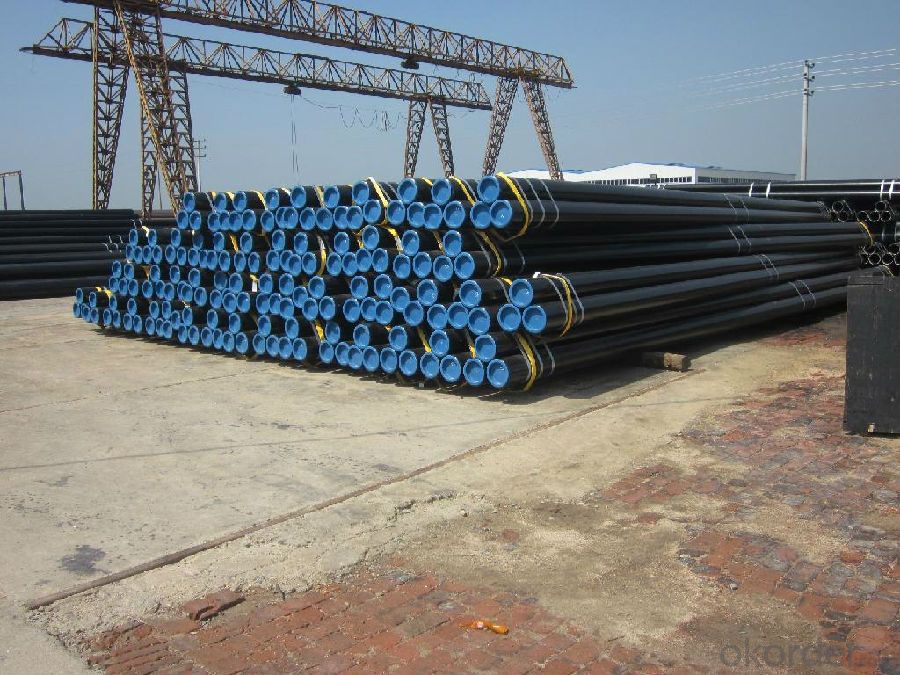
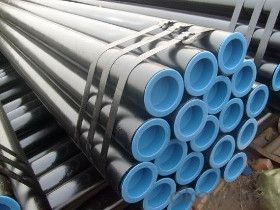
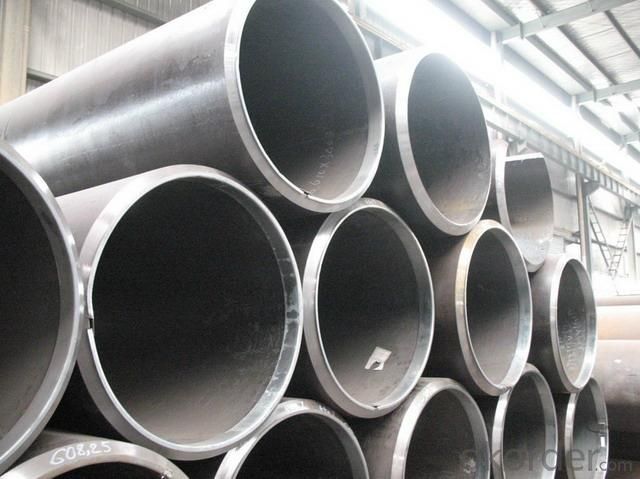
- Q: What are the different types of supports used for steel pipes in buildings?
- Steel pipes in buildings commonly utilize various types of supports. These supports serve different purposes and are typically made of metal or plastic materials. Firstly, pipe hangers are designed to bear the weight of the pipe. They are securely attached to the building structure and prevent the pipe from sagging or shifting. Pipe clamps, on the other hand, are employed to fasten the pipe to a wall or other structural element. These clamps consist of a metal band that encircles the pipe and is then fixed to the structure using bolts or screws. Their main function is to provide stability and prevent any movement or vibration of the pipe. For distributing the weight evenly and offering additional support, pipe shoes are installed beneath the pipe. These support devices are typically made of metal or rubber and can be attached to the building structure or embedded in concrete foundations. To guide the movement of the pipe and prevent excessive bending or shifting, pipe guides are utilized. These guides, usually composed of metal or plastic, are installed at regular intervals along the length of the pipe. Lastly, pipe rollers are employed to support horizontal pipes and permit expansion and contraction due to temperature changes. Made of metal, these rollers allow the pipe to move freely without causing any harm to the building structure. It is crucial to select the appropriate type of support based on the specific requirements of the steel pipe and the building structure. By properly supporting steel pipes in buildings, their stability, durability, and overall safety are ensured.
- Q: What are the different end types for steel pipes?
- There are several different end types for steel pipes, each serving a specific purpose. Some common end types include: 1. Plain End: This is the most basic type of end for steel pipes, where the pipe has no threading or any other special end treatment. Plain ends are typically used for non-threaded applications or when the pipe is intended to be welded. 2. Threaded End: Threaded ends have male threads on one or both ends of the pipe, allowing for easy connection with other threaded fittings or pipes. This type of end is commonly used in plumbing and gas applications where the pipe needs to be easily assembled or disassembled. 3. Beveled End: Beveled ends are cut at an angle, typically 30 or 45 degrees, to facilitate welding. The bevel creates a smooth transition between the pipe and the weld joint, ensuring a strong and secure connection. Beveled ends are commonly used in construction, oil and gas, and pipeline industries. 4. Coupling End: Coupling ends have female threads on both ends of the pipe, enabling two pipes to be joined together using a coupling or a fitting. This type of end is often used in plumbing systems or for connecting sections of pipes that need to be easily disassembled. 5. Flanged End: Flanged ends have a flared or raised lip on one or both ends of the pipe, allowing for easy attachment to other flanged components, such as valves or pumps. Flanged ends are commonly used in industrial applications where the pipe needs to be securely connected to other equipment. 6. Socket Weld End: Socket weld ends have a socket or recess on one or both ends of the pipe, allowing for easy connection with socket weld fittings. This type of end provides a strong and reliable joint, commonly used in high-pressure applications, such as petrochemical or power plants. These are just a few examples of the different end types for steel pipes. The choice of end type depends on the specific application requirements, such as the need for easy assembly, disassembly, or compatibility with other fittings.
- Q: Stainless steel tube, also known as why tube?
- The longitudinal section can be divided into equal section tube and variable cross section tubeThe variable section tube has a conical tube, a stepped tube and a periodically cross section pipe, etc.
- Q: D108*4 what does "D108" mean by seamless steel tubes? What does "*4" mean?
- D108: refers to the outer diameter of 108mm;4: refers to the wall thickness of 4mm.
- Q: Can steel pipes be used for underground gas pipelines?
- Yes, steel pipes can be used for underground gas pipelines. Steel pipes are commonly used in the construction of gas pipelines due to their strength, durability, and resistance to corrosion. They provide a reliable and safe means of transporting gas underground.
- Q: What is the difference between hot-dipped galvanized and electro-galvanized steel pipes?
- Hot-dipped galvanized and electro-galvanized steel pipes are both types of steel pipes that have undergone a galvanization process to protect them from corrosion. However, there are some key differences between the two processes. Hot-dipped galvanized steel pipes are immersed in a molten zinc bath, which results in a thick coating of zinc being applied to the surface of the steel. This process creates a durable and long-lasting corrosion-resistant barrier. The thickness of the zinc coating can vary, but it is generally thicker than that of electro-galvanized steel pipes. On the other hand, electro-galvanized steel pipes are coated with a thin layer of zinc using an electroplating process. This process involves passing an electric current through the steel pipes while they are immersed in a zinc solution. The zinc particles are then deposited onto the surface of the steel, creating a thin and uniform protective barrier. One of the main differences between these two processes is the thickness of the zinc coating. Hot-dipped galvanized steel pipes have a thicker and more robust coating, making them more suitable for applications in harsh environments or where the pipes will be exposed to corrosive substances. Another difference is the appearance of the pipes. Hot-dipped galvanized steel pipes typically have a dull grayish finish, while electro-galvanized steel pipes have a smoother and more polished appearance. In terms of cost, electro-galvanized steel pipes are generally more economical compared to hot-dipped galvanized steel pipes. This is because the electroplating process is less labor-intensive and requires less zinc. Overall, the choice between hot-dipped galvanized and electro-galvanized steel pipes depends on the specific application and the level of corrosion resistance required. Hot-dipped galvanized steel pipes are typically used in more demanding environments, while electro-galvanized steel pipes are suitable for less corrosive applications where cost-efficiency is a priority.
- Q: What is the difference between black steel pipe and galvanized steel pipe?
- The main difference between black steel pipe and galvanized steel pipe lies in their coating. Black steel pipe is untreated and has a dark, matte appearance, while galvanized steel pipe is coated with a layer of zinc to prevent rusting and has a silver, shiny appearance. This coating makes galvanized steel pipes more durable and suitable for outdoor use, while black steel pipes are commonly used for indoor plumbing and gas lines.
- Q: How are steel pipes repaired if they develop leaks?
- Steel pipes can be repaired if they develop leaks through various methods such as welding, clamping, or using epoxy compounds. The specific repair technique depends on the size and location of the leak as well as the type of pipe, and it is typically carried out by trained professionals with the necessary equipment and expertise.
- Q: How do you prevent leaks in steel pipes?
- One effective way to prevent leaks in steel pipes is to apply a high-quality coating or lining to the pipes. This protective layer acts as a barrier, preventing corrosion and minimizing the chances of leaks. Regular inspection and maintenance are also crucial to identify any potential issues early on and address them promptly. Additionally, ensuring proper installation techniques, using durable and reliable fittings, and following industry standards can help minimize the risk of leaks in steel pipes.
Send your message to us
Seamless Black Steel Pipes API5L,GB,ASTM,ASME,DIN
- Loading Port:
- Tianjin
- Payment Terms:
- TT OR LC
- Min Order Qty:
- 44 m.t.
- Supply Capability:
- 500 m.t./month
OKorder Service Pledge
OKorder Financial Service
Similar products
Hot products
Hot Searches
Related keywords
